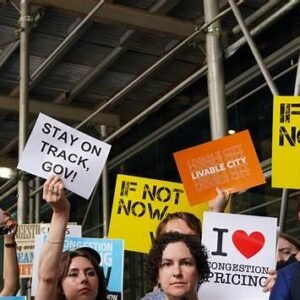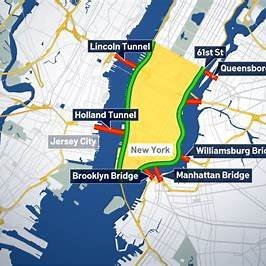Judge Blocks Trump Officials’ Bid to End NYC Congestion Pricing: A Victory for Urban Policy and State Autonomy
By David LaGuerre –
In a significant legal development, a federal judge has temporarily halted the Trump administration’s attempt to dismantle New York City’s congestion pricing program. This decision ensures the continuation of the city’s initiative to reduce traffic congestion and fund public transportation improvements, at least until June 9, 2025. The ruling underscores the ongoing tension between federal authority and state autonomy in urban policy-making.
 Understanding NYC’s Congestion Pricing Program
Understanding NYC’s Congestion Pricing Program
Implemented in January 2025, New York City’s congestion pricing program charges drivers a $9 toll during peak hours to enter Manhattan below 60th Street. The initiative aims to alleviate traffic congestion, reduce pollution, and generate revenue for the city’s mass transit system. The program was initially approved under the Biden administration, reflecting a broader commitment to sustainable urban transportation solutions.
The Trump Administration’s Opposition
In February 2025, the Trump administration rescinded federal approval for the congestion pricing program, citing concerns over the lack of toll-free alternatives and potential economic impacts on commuters. Transportation Secretary Sean Duffy declared the program “dead” and threatened to withhold federal transportation funding from New York State unless the initiative was terminated. This move was part of a broader federal effort to assert control over state-level transportation policies.
Legal Challenge and Temporary Restraining Order
In response to the federal government’s actions, the Metropolitan Transportation Authority (MTA) filed a lawsuit challenging the rescission of approval and the threats to funding. On May 27, 2025, U.S. District Judge Lewis Liman issued a temporary restraining order preventing the Trump administration from withholding federal funds or taking other punitive actions against New York State in relation to the congestion pricing program. The order remains in effect until at least June 9, 2025, allowing the program to continue while the legal case proceeds.
Implications for Urban Policy and State Rights
The judge’s decision highlights the importance of state autonomy in addressing urban challenges such as traffic congestion and environmental sustainability. Governor Kathy Hochul praised the ruling as a victory for New York’s right to manage its transportation systems without undue federal interference. The case also raises questions about the appropriate balance between federal oversight and state innovation in public policy.
 Public Opinion and Political Reactions
Public Opinion and Political Reactions
Public opinion on the congestion pricing program remains divided. Supporters argue that it effectively reduces traffic and provides much-needed funding for public transit, while opponents express concerns about the financial burden on commuters and potential negative impacts on businesses. The legal battle has further politicized the issue, with Democrats generally supporting the program as a progressive urban policy measure, and Republicans criticizing it as an overreach that harms working-class individuals.
 Looking Ahead
Looking Ahead
As the legal proceedings continue, the future of New York City’s congestion pricing program remains uncertain. The temporary restraining order provides a reprieve, but a final decision will depend on the outcome of the MTA’s lawsuit against the federal government. The case serves as a critical test of the limits of federal authority over state-initiated urban policy initiatives and may set a precedent for similar programs in other cities.



